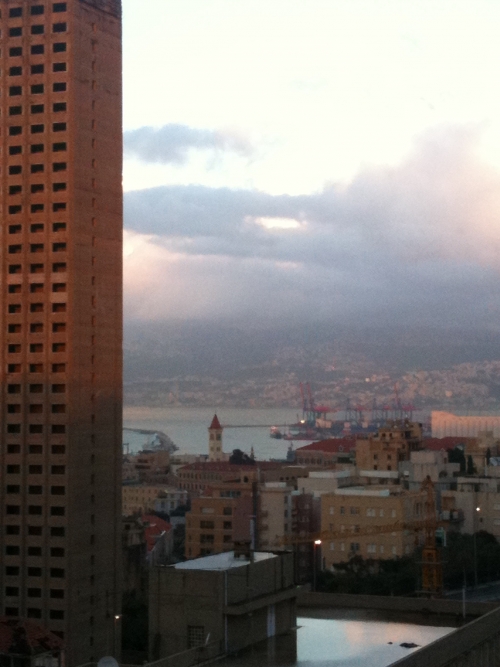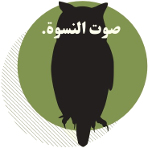
We walk along the avenue.
The long large sidewalk encircling the capital promontory on the edge of the sea. It’s a spring afternoon, year 2024. More than a decade has passed since, to an April day. The light is warm, like a halo effect of an old postcard. I had left the city long ago.
I turn to look at the cityscape facing the sea and Beirut suddenly grips me in a flash of heartache.
It stares back at us, with a cold calmer gaze. Transfixed, a landscape of steel glass and concrete. As I try to separate between an air of nostalgia taking over and some other thing, more forsaken, a bittersweet refrain, commonly called disappointment.
Searching through it, I’m eager to find in it some familiarity, what we knew of each other, where our stories grew.
The little houses Feyrouz sang about in Li Beirut sending kisses to the wounded beautiful city do not exist here anymore.
The hidden passageway harbor of Ain el Mreisseh fishermen has disappeared. It’s a modern parking lot now apparently. Adjacent to that tower, which they tell me appears empty, with no lights at night streaming out from the big floors.
Akin to a sailor’s face the song compared the capital gushing into the sea.
Some years after the war had stopped, for a photo project documenting a Beirut rising up again, an image of a group of kids under an August sun, diving carefree in that little harbor, below an array of flags red and white, seemed to me, like all that it would take. It was national army day, 1999, everything then, seemed possible.
They would tell you then, almost proud, Beirut was an exception in a period of economic crisis- albeit an economic war- land sales and real estate boomed. Beirut was a miracle, flaunted as a straight flush poker lucky hand, where money from the gulf, to be laundered, came out swinging.
And true to our legacy of merchants, we sold it.
The erosion of the city happened almost innocuously. And one by one, house by house, a heritage got surgically removed.
From this seed of greed, a gray concrete town grew and dwarfed the small awkwardly born jewel of Mediterranean, Arab and Levantine influences.
Like a bent branch made tame by some persistent wind, they chiseled, carved another facade out of it, painstakingly, more to the liking of investors, a playground for the “sister” countries of the Gulf.
I remember then when a part of a Phoenician wall port was found in a building excavation, right next to Phoenicia hotel, a home brand of our welcoming tradition. Quickly along with the bank investing in the land promotion, a solution was found by developers. Cut it out and place it somewhere where it would not bother the construction anymore. History was packaged to be delivered elsewhere easily indeed. The tower was branded with the name Venus, like a promise rising out of the seabed in Botticelli form.
Advertisements featured contractors and real estate empire projects from the Gulf. There the construction had halted in the crisis. Beirut was a boon.
On the big breakwater of the reclaimed land Solidere had built, I used to walk to be able to just see the city from this artificially far point, deep in sea water, and imprint it more, like a tattoo in my memory. The cranes in the backdrop then announced the new tempo.
On the street walls of old neighborhoods like Mar Mikhayel and Qobayyat, advertisements were plastered all around asking for what was remaining of its old buildings for sale.
About a garden, a park meant for the public. Unless you had the luck to have been handed a French passport, not a Venezuelan one nor an Swedish, definitely not a Lebanese, you could not have ventured and sat under the trees of one of the rare spaces in the city, Horsh Beirut. If you’d ask the army guarding it, they would tell you, matter of fact, the same. Dare you ask?
At some point before I left, authorities frolicked with the idea of selling Sanayeh park for another park, of cars.
Then one night, on a cold January, an old residential building in the Ashrafieh area crumbled down, with 27 residents losing their life in the rubble. Recently sold, the owner was against doing renovations to the edifice; and the old rents barely covered that. They said the new tower getting built next to it had maybe also rendered the older one more fragile. Old rental laws, shamelessly permissive new construction laws, neglect and poverty… A drafted script preparing a tragedy.
So there was the metaphor. For this wounded broken place…Losing its soul in the concrete rubble.
I stare away from the backdrop, and remember Nadia Tueni’s poem, Beirut dying a thousand times, a thousand times reborn again.
We will meet then sometime again one day.
Publisher:
Section:
Category:






